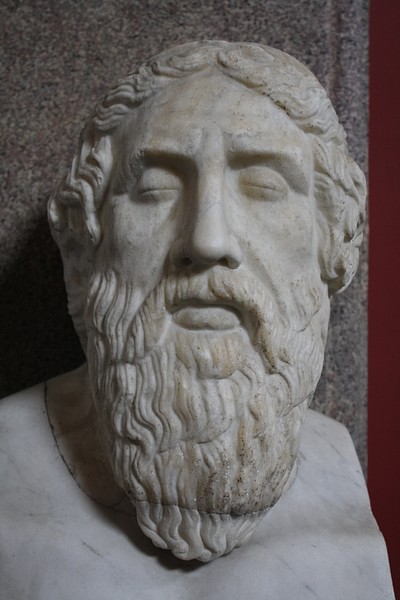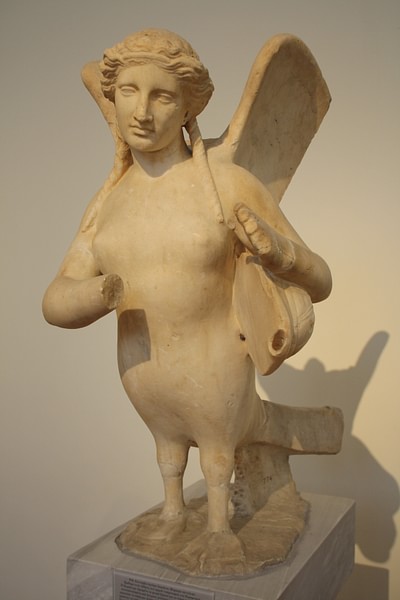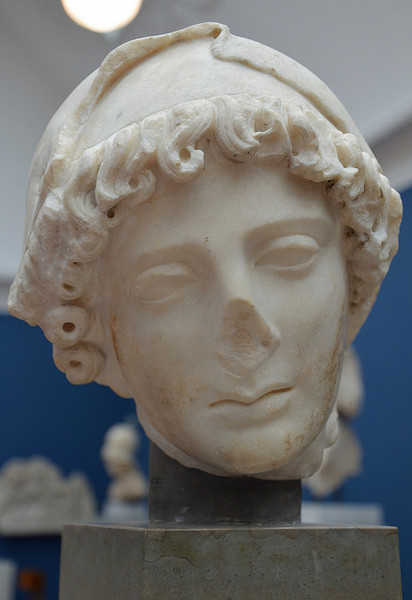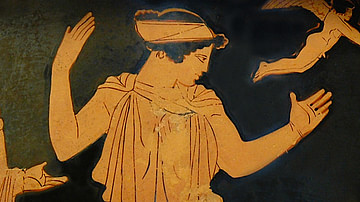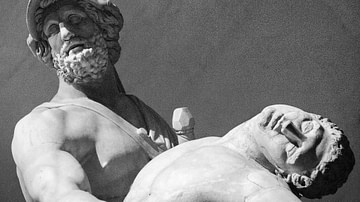
Homer's Odyssey is an epic poem written in the 8th century BCE which describes the long voyage home of the Greek hero Odysseus. The mythical king sails back to Ithaca with his men after the Trojan War but is beset by all kinds of delays and misadventures where he battles monsters and storms but also resists (eventually) the advances of beautiful women in the knowledge that, all the while, his faithful wife Penelope is awaiting him. For the Greeks, the story occurred sometime in the 13th century BCE during the Bronze Age, in a heroic golden era much better than today's sorry state of affairs.
The Odyssey is such a timeless story not only for its terrifying monsters, rip-roaring action scenes, and wealth of information on Mediterranean geography and legends but also because it involves the irresistible plot line of a worthy hero trying desperately to get back to his city, his family, and his throne. The reader is in equal measures thrilled and exasperated, just like Odysseus himself, with every new setback and wills the hero to finally make it home. The Odyssey is the first, and for many, still the best page-turner ever written.
Background
The Odyssey, written sometime in the 8th century BCE (although some scholars would place it in the 6th century BCE), is an epic poem of more than 12,000 lines organised by scholars in Alexandria into 24 books. The Greeks thought its author Homer was from Chios or Ionia and credited him with both this book and its prequel the Iliad, the two masterpieces of Greek literature. They also thought him the greatest ever writer and referred to him simply as 'the poet.' Homer drew on a long oral tradition of telling the Greek myths, and this heritage is seen in the repetition of epithets, introductory phrases, and recurring descriptive formulas. Some scholars see the Odyssey as the work of Homer in later life, hence the slightly different subject and style compared to the Iliad. Other scholars maintain that it is the work of another author precisely because of these differences. The issue is unlikely ever to be resolved.
The poem covers the voyage of Odysseus, the mythical king of Ithaca, on his return home from the Trojan War in Anatolia. The Greeks had finally sacked Troy after a 10-year siege, but their ruthlessness in doing so incurred the wrath of the gods. Their voyage in the grand fleet was to be hit by storm and misfortune, and none more so than the ship of Odysseus.
Like the Iliad, which covers only 52 days of the Trojan War, the Odyssey only covers 42 days of Odysseus' 10-year voyage, the events which happened previously are told in flashback. Again, this is because Homer is perhaps more concerned with a universal truth rather than a simple homecoming story. The adventures of the hero against strange peoples and monsters is a device to show throughout the value and necessity of civilization, that life in ordered Greek Ithaca is superior to that of the foreign lotus-eaters and barbaric Cyclops. Odysseus will receive life-threatening trials and irresistible temptations (even an offer of immortality, besides those of the flesh), he is frequently aided by Athena but constantly at the mercy of Poseidon, and he must, literally, go to hell and back, but his desire to return home to civilization will never die, and his superior skills and culture, along with a divine will, ensure that he does. There could be no other ending; civilization will, as always, prevail.
Book 1 – Interlopers Have Taken over the Palace
We jump into the story near the end when Odysseus is held in the clutches of the Nymph Calypso on her remote island. All the other heroes destined to return safely home after the Trojan War have already done so. Poseidon has got it in for Odysseus because he killed the god's son Polyphemus, the Cyclops, but the gods now agree that the hero will be allowed to return home too. Meanwhile, on Ithaca, many unscrupulous and entirely unworthy suitors, 108 to be precise, try to win the favour of Penelope, Odysseus' wife, and have taken over the palace for their own pleasure. We also meet the hero's son Telemachus, a fine specimen of a lad with good sense. Athena, in disguise, tells Telemachus to go forth in a ship and find his father so that this crowd of imposters can be shown their true place. If he cannot find his father, then he must clear the palace himself and find the queen a suitable new husband.
Book 2 – Penelope Stalls & Odysseus Will Return
We are told how 'wise' Penelope has resisted the relentless pressure of her suitors to remarry - one ruse was to promise her hand only when a shroud for her father-in-law Laertes was completed, but each night she undid the work of the day. An omen of two eagles fighting each other is taken by Halitherses to indicate that Odysseus is fated, after a lapse of 20 years, to return and put his house in order by taking a terrible revenge on those who plunder his wealth. Athena again tells Telemachus to leave Ithaca and find his father, and with her help, a ship and crew are gathered.
Book 3 – Telemachus Meets Nestor
Telemachus arrives at the palace of Nestor at Pylos. The aged hero tells of how, after the fall of Troy, the Greek fleet split and he does not know what became of Odysseus' ships and men. Nestor recounts how Agamemnon was killed by Aegisthus on his return to Mycenae but Orestes avenged his father's killer. It is a warning for the young prince not to leave Ithaca too long at the mercy of Penelope's suitors.

Book 4 – Telemachus Meets Menelaus
Telemachus arrives at the palace of Menelaus at Sparta. The king does not know the fate of Odysseus either. Helen tells of the time Odysseus daringly entered Troy disguised as a beggar, and Menelaus tells of the great Wooden Horse which the Greeks used to enter the city. Menelaus then recounts his meeting with the Old Man of the Sea near Pharos who told him that Odysseus was being held in the clutches of the Nymph Calypso on her remote island. Meanwhile, back on Ithaca the suitors are playing sports and still eating Odysseus out of house and home. They discover Telemachus' expedition and plan to ambush him at Asteris. Athena reassures Penelope no harm will ever come to her son.
Book 5 – Zeus Commands Calypso to Release Odysseus
Athena persuades Zeus to free Odysseus from the clutches of Calypso. Hermes is sent to relay the message, and while Calypso is indignant after having rescued the shipwrecked mariner, she bows, as all must do, to the will of Zeus. Well, almost, for she offers one last persuasion for the hero to stay: immortality. Odysseus refuses after sleeping with the Nymph one last time and then makes a raft to sail away. He will reach the welcoming Phaeacians but only after an arduous 20-day voyage beset by storms from Poseidon.
Book 6 – Nausicaa Welcomes Odysseus
After Athena ensures our hero safely arrives at the land of the Phaeacians, the princess Nausicaa finds the shipwrecked mariner just landed on the beach with nothing more than a scrap of foliage to cover his modesty. He is given a wash and brush-up, a fine new robe, and food so that he looks mightily impressive once more.
Book 7 – Odysseus Meets Alcinous
Odysseus arrives at the royal palace of Alcinous which is resplendent with bronze walls, gold statues, and lush fruit trees. The king agrees to Odysseus' request for aid so that he might return to Ithaca.
Book 8 – The Phaeacian Games
To give our hero an appropriate send-off a feast is prepared and after that some sporting games which Odysseus wins with ease. The games are preceded by a bard telling the quarrel between Odysseus and Achilles and then followed by the tale of how Hephaistos entrapped Ares when he tried to seduce his wife Aphrodite. Finally, another story is sung of the Wooden Horse, and the king reveals a prophecy that one day a fine ship sailing from Phaeacia will be wrecked by Poseidon.
Book 9 – The Cyclopes
Alcinous asks Odysseus to tell the court of his adventures. The hero obligingly describes his plundering of the Cicones who, unsurprisingly, fought back and chased his men from the place. They were then hit by storms and ended up in the land of the lotus-eaters where some of the men ate the legendary lotus fruit which makes people forget. Leaving before the entire crew succumb to the lethargy-inducing fruit, the group arrive in the land of the Cyclopes. These one-eyed giants, although good cheesemakers, are insular; they have no laws and no sense of community, they are, therefore, vastly inferior to the civilised world to which Odysseus belongs.
The men come across a cave full of supplies and wait inside for the owner to return, but when he does, the giant Cyclops closes the cave entrance with a huge boulder. The monster makes a snack of two men for dinner and two more again for breakfast. Resourceful Odysseus then gets the Cyclops drunk on wine and blinds him with a giant pole he has sharpened. The men are able to escape the grasps of the wounded monster by tying themselves beneath the bellies of Polyphemus' sheep. Hurling a rock at Odysseus' ship as it sails away, the Cyclops calls on his father Poseidon to make sure the heroes never return home alive.
Book 10 – Aeolus & Circe
Odysseus' men are entertained by Aeolus, the god of the winds, on the fabulous island of Aeolia. Aeolus gives Odysseus the gift of a leather bag, inside which are all the winds. It is carefully stowed in the hold of the ship. After nine days of favourable winds directed by Aeolus, the heroes actually get within sight of home when disaster strikes. Odysseus falls asleep and his crew, thinking the bag is full of gold, open it and release the winds, which promptly blow the fleet all the way back to Aeolia. The wind god refuses to help such a cursed group for a second time, but the heroes manage to get to Telepylus. Here the men get a hot reception from the Laestrygonians, who pelt the ships with rocks and eat the men who landed ashore.
Next, the ever-dwindling heroes, now pretty much lost, land at Aeaea, home of the goddess Circe. The noted sorceress welcomes a group of them with a drink which makes the men lose all memory. Worse, it also turns them into pigs. Odysseus discovers their fate and sets off to free them, meeting Hermes on the way who gives him a drug to make him immune to Circe's potions. After making the goddess promise to release his men the pair retire to Circe's chambers. The party stays an entire year, the men enjoying great food and Odysseus enjoying Circe. Eventually, Odysseus may leave, but Circe insists that he first visits Hades where the dead prophet Teiresias will give him directions how to get home to Ithaca.
Book 11 – Odysseus Visits Hades
Down in dreaded Hades, Teiresias tells Odysseus he has a chance of reaching home, ridding the palace of interlopers, and dying a peaceful death of old age, but he absolutely must not molest the sacred cattle of the sun god Helios on his island of Thrinacie. Odysseus meets many other spirits including his mother, Leda, Agamemnon, Achilles, Minos, Orion, Tantalus, Sisyphus, and Hercules.
Book 12 – The Sirens, Scylla & Charybdis
Odysseus returns to Circe, who warns him of the Sirens, creatures which are half-bird and half-woman who prey on sailors. She advises the men to plug their ears with wax and for Odysseus to lash himself to the mast. He must then negotiate passage past the six-headed monster Scylla and deadly whirlpool Charybdis. He also receives his second warning of the folly of interfering with the herds of Helios. The heroes set sail across the wine-dark sea once more and negotiate the perils described by Circe to reach Thrinacie. Stuck on the island with unfavourable winds, the men eventually get so desperately hungry they slaughter a few cattle while Odysseus is asleep. Revenge is swift, and the ship is wrecked by a storm as soon as they set off from the island. The only survivor is Odysseus, blown back into the clutches of Charybdis. Saved by the branch of a fig tree, Odysseus is spewed out of the whirlpool, and after nine days adrift on the flotsam of his ship, he lands, once again the shipwrecked mariner, on the island of Ogygia, home of the Nymph Calypso.
Book 13 – Ithaca at Last
Reminiscences over with, Odysseus now bids farewell to Alcinous and sets off from Phaeacia. The hero finally lands on Ithaca. It is the end of his 10-year odyssey and 20-year absence but only the beginning of his battle to regain his throne. Poseidon has one more petulant trick and sinks the returning Phaeacian ship, thus fulfilling the prophecy. Meanwhile, Athena appears and tells Odysseus not to reveal his true identity when he returns to the palace as he must deal with Penelope's horde of suitors. Athena transforms him into an old beggar and leaves to fetch Telemachus from Sparta.
Book 14 – Eumaeus the Swineherd
Odysseus finds his faithful old servant the swineherd Eumaeus living in the hills but remains in disguise and pretends to be a Cretan adventurer. The king is fed, watered, and updated on the situation at the palace. Eumaeus describes what a fine lad Telemachus has become; he who was only a babe when Odysseus left for the Trojan War.
Book 15 – Athena Warns Telemachus
Athena urges Telemachus to return to Ithaca and warns him that the suitors are waiting in ambush for his ship near Samos. He is told to first report to Eumaeus. After a feast and accepting a fine silver and gold cup from Menelaus, he departs. Meanwhile, Odysseus is informed by Eumaeus that his father Laertes is still alive and praying daily for the king's safe return. Telemachus arrives on Ithaca.
Book 16 – Odysseus Meets Telemachus
Telemachus arrives at Eumaeus' hut. After initially continuing his disguise, Odysseus reveals his true self to Telemachus and the pair tearfully embrace. Odysseus tells his son to return to the palace and he will go there too but disguised as the old beggar. Telemachus must remove all weapons from the great hall, and whatever happens, he must not reveal his father's true identity.
Book 17 – Odysseus Returns to the Palace
Telemachus returns to the palace where his mother is delighted to see him again and the suitors are not. Odysseus arrives at his palace, still in disguise and unrecognised except by his old dog Argus. The king goes around the suitors begging for a small offering and is abused – verbally and physically.
Book 18 – Two Beggars
Another beggar, Irus, arrives at the palace, and he fights with Odysseus while the suitors watch on gleefully. Odysseus wins easily, but not too easily to give away his disguise. Meanwhile, Penelope, made even more beautiful by Athena, persuades each of her suitors to present her with a fabulous gift.
Book 19 – Odysseus is Recognised
As night falls Odysseus reminds Telemachus to remove all weapons from the great hall the next day. Still in disguise, Odysseus chats with Penelope who reveals how she has delayed the suitors while her husband repeats his Cretan adventurer cock and bull story. Later, a servant, Eurycleia, bathes the guest and recognises the king when she sees an old scar but is made to keep silent. Penelope reveals her plan to find the best suitor by having a shooting competition to see who can pass an arrow through twelve axe heads. Odysseus the beggar approves. Tomorrow will be the reckoning.
Book 20 – The Suitors Gather
Odysseus ponders how to deal with Penelope's horde of suitors as they gather in the great hall for the day's festivities. During the feast, Odysseus the beggar is abused – verbally and physically.
Book 21 – The Bow of Odysseus
Penelope fetches her husband's long disused bow from a storeroom and challenges the suitors to a shooting competition; the victor will win her hand. The bow is such a mighty weapon, though, that none of the suitors can even string it, never mind fire an arrow through the 12 axe heads. Meanwhile, Odysseus instructs the servants to bar all doors to the great hall. The king then effortlessly strings the bow and twangs the string so that it sings like a 'swallow' - significantly, the bird which returns each year to the same nest just as our hero is about to do. Zeus causes a peal of thunder, and Odysseus fires his arrow straight and true through all 12 axeheads.
Book 22 – Odysseus' Revenge
Odysseus turns to the gathering and reveals his true identity. The king is merciless and picks off the suitors one by one with his deadly arrows. Odysseus, the sacker of cities, now throwing spears and slashing with his sword, kills them all so that the palace hall is strewn with smashed heads and rivers of blood. Then those servants who were disloyal are rounded up and hanged.
Book 23 – King & Queen Reunited
Odysseus and Penelope are reunited. Some scholars consider the Odyssey to end here on stylistic grounds, others that the rest ties off a few loose ends. The text continues with husband and wife recounting all that has happened in each other's absence. Odysseus prepares to meet the clans of the slain suitors.
Book 24 – Peace in Ithaca
Hermes leads the souls of the dead suitors down to the dreaded Halls of Hades. They meet Achilles and Agamemnon and recount the story of Odysseus' revenge. Meanwhile, Odysseus is reunited with his father Laertes. Then a short battle follows between the king and the families of the dead suitors, but the gods intervene, and peace is restored to the kingdom of Ithaca. Thus ends the Odyssey.
